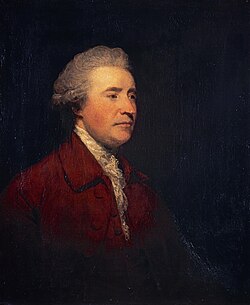Edmund Burke
| Edmund Burke | |||
|---|---|---|---|
 | |||
| Født | 12. jan. 1729[1][2][3][4] Dublin[5] | ||
| Død | 9. juli 1797[6][1][2][3] Beaconsfield[5] | ||
| Beskjeftigelse | Politiker, filosof, skribent, statsviter | ||
| Embete |
| ||
| Utdannet ved | Trinity College | ||
| Ektefelle | Jane Mary Nugent[7] | ||
| Parti | Whig Rockingham Whigs (1765–1784) | ||
| Nasjonalitet | Kongeriket Irland | ||
| Signatur | |||
 | |||
Edmund Burke (født 1. januarjul./ 12. januar 1729greg. i Dublin, død 9. juli 1797 på Gregories nær Beaconsfield i England) var en britisk politiker og politisk filosof. Han regnes som konservatismens grunnlegger. Burke tilhørte det britiske partiet whigene.[8]
Bakgrunn og virke
[rediger | rediger kilde]Burkes ideer skiller seg fra andre ideologer, siden han egentlig ikke konstruerte noen ny ideologi. Han fastslo i stedet noen prinsipper (de fleste har blitt stående) som etterkommere viderebygde konservatismen på. Hovedverket til Burke var Betraktninger over revolusjonen i Frankrike (originalens tittel: Reflections on the Revolution in France) (1790).
Burke støttet, i motsetning til flesteparten av sine samtidige landsmenn, den amerikanske revolusjon. Han mente at det var den britiske kongen som hadde angrepet amerikanernes rettigheter.
Under den franske revolusjonen noen få år senere, hadde Burke (ifølge mange) derimot helt motsatt holdning. Nå var han en ivrig motstander av de revolusjonære og deltok i den såkalte revolusjonsdebatten.
Den endrede holdningen begrunnet Burke med at de franske revolusjonære, i motsetning til amerikanerne, ville kullkaste hele staten og bygge opp noe nytt. En slik holdning strider med konservatismens grunndoktriner; evolusjon fremfor revolusjon. Burke var særlig kritisk til voldsbruken under den franske revolusjon.
Referanser
[rediger | rediger kilde]- ^ a b Gemeinsame Normdatei, besøkt 26. april 2014[Hentet fra Wikidata]
- ^ a b Autorités BnF, data.bnf.fr, besøkt 10. oktober 2015[Hentet fra Wikidata]
- ^ a b Archive of Fine Arts, cs.isabart.org, abART person-ID 26260, besøkt 1. april 2021[Hentet fra Wikidata]
- ^ Hrvatska enciklopedija, Hrvatska enciklopedija-ID 10260[Hentet fra Wikidata]
- ^ a b Store sovjetiske encyklopedi (1969–1978), «Бёрк Эдмунд», besøkt 28. september 2015[Hentet fra Wikidata]
- ^ Encyclopædia Britannica Online, Encyclopædia Britannica Online-ID biography/Edmund-Burke-British-philosopher-and-statesman, besøkt 9. oktober 2017[Hentet fra Wikidata]
- ^ Oxford Dictionary of National Biography, Oxford Biography Index Number 4019[Hentet fra Wikidata]
- ^ «Edmund Burke (1729 - 1797)», BBC History
Litteratur
[rediger | rediger kilde]- Av Burke
- Edmund Burke Betraktninger over revolusjonen i Frankrike utgitt i serien Bokklubbens Kulturbibliotek oversatt av Erik Ringen og med innledende essay av Raino Malnes ISBN 978-82-525-5210-2
- Fritt tilgjengelige e-bøker av Edmund Burke i i Project Gutenberg
- Om Burke
- Bryld, Claus (2021). Edmund Burke: Konservatismens profet. Oversatt av Lars Nygaard. Oslo: Dreyer. ISBN 978-82-8265-517-0.
- Thyness, Paul (1967). Edmund Burkes politiske filosofi: de konservative grunnidéer. Oslo: Tanum.
- Langslet, Lars Roar (1965). Konservatismen fra Hume til idag. Oslo: Dreyer.
- Bibliografi
- A Vindication of Natural Society (1756)
- A Philosophical Enquiry into the Origin of Our Ideas of the Sublime and Beautiful (1756)
- An Account of the European Settlement in America (1757)
- The Abridgement of the History of England (1757)
- Annual Register editor for some 30 years (1758)
- Tracts on the Popery Laws (Early 1760s)
- On the Present State of the Nation (1769)
- Thoughts on the Cause of the Present Discontents (1770)
- On American Taxation (1774)
- Conciliation with the Colonies (1775)
- A Letter to the Sheriffs of Bristol (1777)
- Reform of the Representation in the House of Commons (1782)
- Reflections on the Revolution in France (1790)
- Letter to a Member of the National Assembly (1791)
- Appeal from the New to the Old Whigs (1791)
- Thoughts on French Affairs (1791)
- Remarks on the Policy of the Allies (1793)
- Letters on a Regicide Peace (1795–97)
- Letter to a Noble Lord (1796)
Eksterne lenker
[rediger | rediger kilde]- (no) «Edmund Burke» i Store norske leksikon
- «Edmund Burke», fra Stanford Encyclopedia of Philosophy (engelsk)
Text is available under the CC BY-SA 4.0 license; additional terms may apply.
Images, videos and audio are available under their respective licenses.
